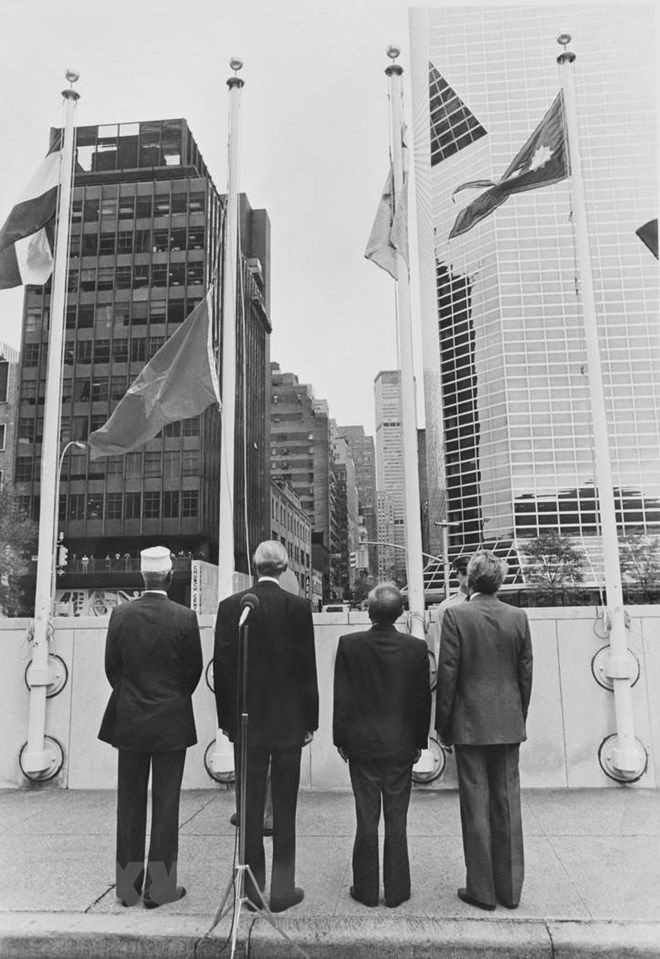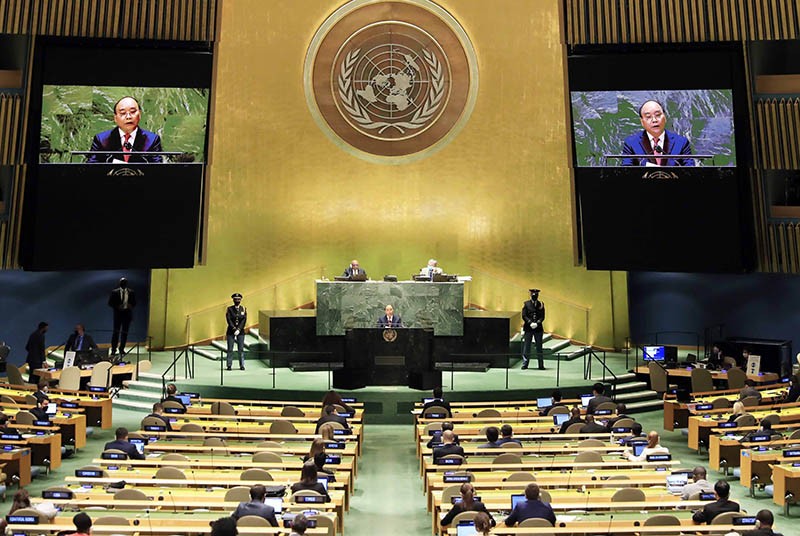
Enhancing Viet Nam’s multilateral diplomacy: Proactive, active, substanstial contributions at the United Nations
Latest
In Viet Nam, multilateral diplomacy is considered as one among the priorities of the foreign policy of the country's Party and State.
 |
| The flag raising ceremony at the United Nations headquarters on September 20, 1977, marking Viet Nam's membership of the largest international organization. (Photo: VNA) |
The focus of multilateral diplomacy
During the early days of the newly-born Democratic Republic of Viet Nam, President Ho Chi Minh sent a letter to the President of the United Nations General Assembly, requesting recognition and admission of Viet Nam to become a UN member.
Most recently, the Secretariat of the Communist Party of Viet Nam issued Directive No. 25-CT/TW on promoting and enhancing multilateral diplomacy by 2030.
The Directive is considered as one of the first guidelines for the country's multilateral diplomacy, making it a strategic orientation and an effective way for national construction and protection.
The documents of the 13th National Party Congress continue to emphasize the policy of “enhancing multilateral diplomacy”. Accordingly, Viet Nam needs to participate actively and promote its role in multilateral mechanisms, especially ASEAN, the UN, APEC, Greater Mekong Sub-region, and other international and regional institutions.
Since joining the UN on September 20, 1977, Viet Nam has consistently proven itself to be a responsible member of the international community.
After 44 years, Viet Nam has made active and increasingly substantial contributions to the UN's activities, including upholding the role of the UN and multilateralism, promoting respect for the UN Charter and international law, developing equal and cooperative relationships between countries, conducting self-determination and opposing oppression, aggression and unilateral embargos in international relations.
At the same time, Viet Nam has participated in and contributed to the discussion and issuance of many important UN resolutions and statements on cooperation, development, disarmament, counter-proliferation of weapons of mass destruction, counter-terrorism, and insurance of human rights.
With its contributions, Viet Nam has been elected into a number of important positions and agencies of the United Nations such as at the UN Security Council, United Nations Human Rights Council, Economic and Social Council (ECOSOC).
Message of international cooperation
Viet Nam’s commitments to the world were once again reflected in the recent visit by Viet Nam's State President Nguyen Xuan Phuc to attend the 76th United Nations General Assembly (UNGA) in September.
One of the most pressing issues at the UNGA was the control of the Covid-19 pandemic worldwide. Covid-19 and its related issues have put mounting pressures not only on the health sector but also on other critical areas such as economics, security, and international cooperation.
 |
| President Nguyen Xuan Phuc speaking at the high-level general debate of the 76th UNGA. (Photo: VNA) |
Therefore, in his speech at the high-level general debate of the 76th UNGA, President Nguyen Xuan Phuc called upon countries to step up international cooperation, and to promote access to Covid-19 vaccines and drugs, so that no country is left behind.
In addition, the President called for enhancement of cohesion for the fastest and most inclusive economic recovery towards a stable global economy.
As a small and medium-sized country, Viet Nam always respects and promotes multilateralism. This has been continuously affirmed through Viet Nam's foreign policy of independence, self-reliance, multilateralisation, diversification, peace, friendship, cooperation and development, as well as in the document of the 13th National Party Congress and Directive No.25 in on promoting and enhancing the role of multilateral diplomacy.
Against the backdrop of increasing tensions among major powers and growing global interdependency, especially the negative impacts of the Covid-19 pandemic and climate change, it is high time for deepened multilateral coordination.
As a responsible member of the international community, Viet Nam confidently upholds multilateralism, strongly affirms its observance of international law peaceful settlement of disputes, upholding the role of regional and international organizations in solving security challenges.
In addition, Viet Nam has been very active in providing ideas, platforms, and resources to international organizations, from ASEAN connectivity programs to UN peacekeeping operations.
More importantly, Viet Nam is about to end its 2020-2021 tenure as a non-permanent member of the U.N. Security Council. Viet Nam will be remembered as a responsible member that focuses on essential topics such as the protection of civilians and essential infrastructure work in conflict areas, the safeguarding of women and children during armed conflicts, the settlement of bombs and mines left by war, U.N. peacekeeping operations, climate change, and peace and security challenges.












